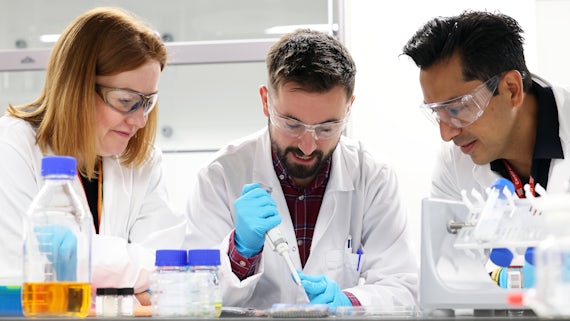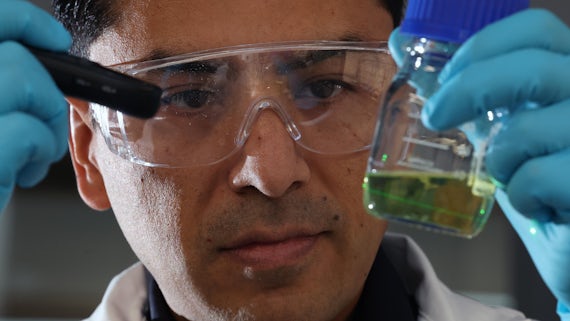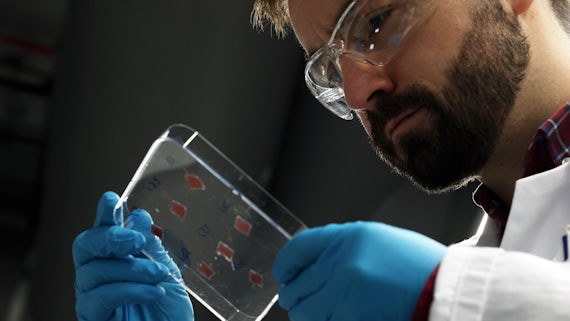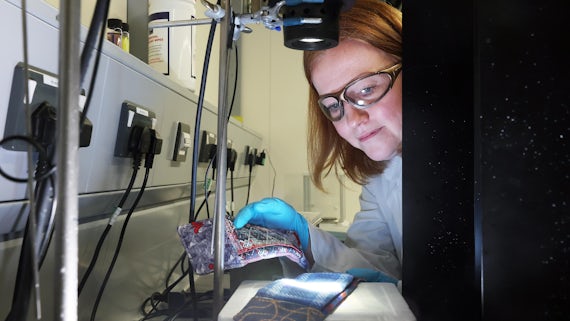Remote rural communities in Nepal to participate in study of self-cleaning period products
7 December 2023
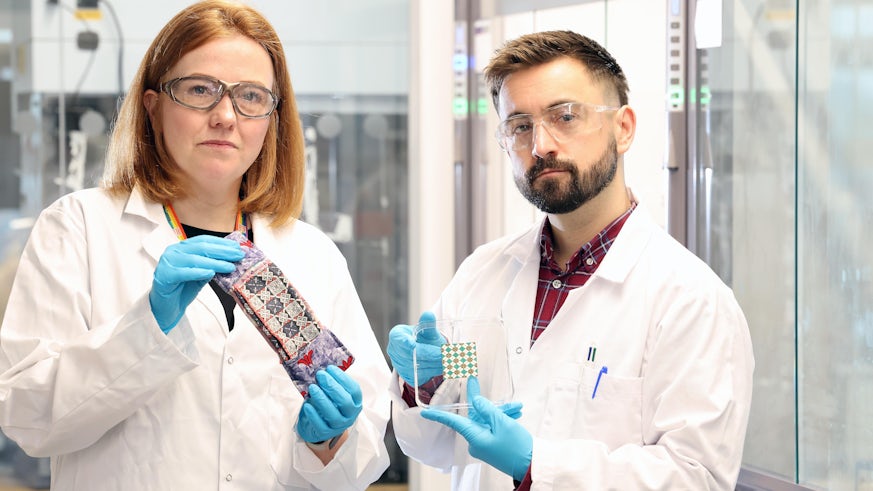
Self-cleaning period products designed to kill up to 99.999% of bacteria when exposed to sunlight are to be distributed in remote rural communities in Nepal.
300 pads fitted with a fabric insert developed by Cardiff University scientists will be given out as part of a programme of field studies funded by the Bill & Melinda Gates Foundation.
The fabric is infused with non-toxic metal catalysts which harnesses the energy of the sun to kill bacteria, remove stains, and neutralise odours. It only needs to be rinsed with water and then left to dry in the sun for 15 minutes to complete the cleaning and disinfecting process.
The team of researchers, from the University’s Schools of Chemistry, Pharmacy and Pharmaceutical Sciences, and Medicine, will compare their prototype pads with reusable washable pads already in use across the region and routinely supplied by the project’s charity partners.
Dr Jennifer Edwards, project lead from Cardiff University’s School of Chemistry, said: "We’ve achieved a thorough understanding of how the fabric works in our labs over an intensive two-year cycle of research and development. Now it’s time to take the product into real-world communities where it has the potential to make a difference by reducing the risk of reproductive and urinary tract infections."
Earlier this year, the team travelled to Nepal where up to half of female agricultural workers are estimated to be experiencing urogenital infections at any given time.
In the global south, urogenital infections are frequently associated with poor health and reproductive outcomes, including miscarriage. They are also linked to negative social outcomes, including absences from school or work.
The six-month study will seek feedback from participants on their experiences using the pads.
The research team will also conduct detailed chemical and microbiological analysis of pads following several months of normal use by participants.
Both activities will contribute to further development of this innovative product.

Professor Jean-Yves Maillard, project co-lead from the University’s School of Pharmacy and Pharmaceutical Sciences, said: "This project is the essence of innovation, the application of a novel really powerful antimicrobial technology to the real world, with the potential to benefit millions of women worldwide."
Dr Edwards added: "The field studies will help us learn about patterns of use in the region, including washing and drying, and, particularly, the cultural sensitivities that might surround menstrual health and hygiene.
"We’ll also be collecting data on how our product responds to the microorganisms found in Nepal to make sure our prototype is effective against a broad spectrum of pathogens."

Understanding these local practices and collecting these data are crucial to the development of our product on a wider scale, which we hope will enable safe and affordable access to period products for those who need it.
Working with the Centre for Trials Research (CTR) at Cardiff University, research expertise at Tribhuvan University and non-governmental organisation (NGO) Global Action Nepal the team aims to better understand the needs of users in low- and middle-income countries, where access to single-use period products is both costly and limited.
Dr David Gillespie, Director of Infection, Inflammation and Immunity Trials at the CTR, said: "We’re excited to support this global health study by providing our expertise for this in-field evaluation.
"Robust evaluation, including feasibility and pilot work, should underpin the development of all innovations such as this, and we’re eager to see what we learn from this study to ultimately inform wider scale-up and adoption."
Rebecca Milton, a Research Associate/Trial Manager at the CTR, added: "Fostering collaborations with NGOs, researchers, academics, and community champions in Nepal is fundamental to the success of these research studies.
"We are keen to learn from our partners in Nepal and to share best practice along the way. This will ensure the longevity of a period product that has the potential to improve the quality of life for women in this region."
The programme of field studies will also include focus groups and workshops in communities with support from NGOs and community champions like local ‘pad man’ Krishna Poudel, who manufactures pads, provides menstrual health and hygiene education in schools, and teaches women and girls how to make their own traditional products.
These sessions will enable the team to demonstrate how to use their products while also learning about the social, economic, cultural and environmental factors surrounding menstruation in rural Nepal.

Countless individuals worldwide still lack access to reliable solutions to manage their periods safely. Our team's progress in the past year has been nothing short of transformative. As we gear up to trial our product, we’re not just innovating; we’re paving the way towards a brighter future for global menstrual health.

Dr Edwards and Dr Pascoe were one of 11 project teams to present their research to Bill Gates during a poster session at the Grand Challenges Annual Meeting in October.
Under the overall theme of "Science Saves Lives," this year's meeting was held in Dakar, Senegal and explored how the global health community can expand the frontiers of science and innovation to save and improve lives.
Dr Pascoe added: "Our research dives straight into the core of this global challenge. It was a pleasure to highlight our strides during the Grand Challenges Annual Meeting — showcasing our journey in crafting a period product that is safe, economically accessible, and environmentally sustainable."
